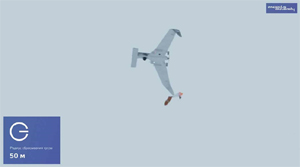



Date:04/04/18
 The Russian University of Innopolis and the company ENIKS successfully tested a mail drone.
The Russian University of Innopolis and the company ENIKS successfully tested a mail drone.
The Т16 robocourier delivered a parcel at a distance of 38 km and returned back. The total flight range was 76 km. It took it an hour to deliver the parcel and return back.
During the tests, T16 flew at a speed of 65 km/h at an altitude of 500 m. According to the engineers, the UAV's maximum speed is 130 km/h, the altitude is up to 4 km, and the maximum possible distance is up to 150 km.
The drone dropped the parcel within 1 meter of the calculated point. Developers want to increase the accuracy of the load in the urban environment to a centimeter.
In addition to postal goods, T16 will be able to deliver medicines, provisions and any other correspondence to hard-to-reach places. "Sometimes, to deliver a cargo by land, one needs to go around 200-300 km, overcome mountains, rivers, etc.," said Alexander Klimchik, head of the Robotics Development Center. "UAV will save money and will deliver cargo directly, reducing the distance to 25-30 km."
According to Klimchik, now Innopolis is developing an AI-based control system, which will allow the robocourier to adjust the route during the flight and to take into account obstacles encountered along the way, Vesti reports.
University of Innopolis tests successfully a mail drone
 The Russian University of Innopolis and the company ENIKS successfully tested a mail drone.
The Russian University of Innopolis and the company ENIKS successfully tested a mail drone.The Т16 robocourier delivered a parcel at a distance of 38 km and returned back. The total flight range was 76 km. It took it an hour to deliver the parcel and return back.
During the tests, T16 flew at a speed of 65 km/h at an altitude of 500 m. According to the engineers, the UAV's maximum speed is 130 km/h, the altitude is up to 4 km, and the maximum possible distance is up to 150 km.
The drone dropped the parcel within 1 meter of the calculated point. Developers want to increase the accuracy of the load in the urban environment to a centimeter.
In addition to postal goods, T16 will be able to deliver medicines, provisions and any other correspondence to hard-to-reach places. "Sometimes, to deliver a cargo by land, one needs to go around 200-300 km, overcome mountains, rivers, etc.," said Alexander Klimchik, head of the Robotics Development Center. "UAV will save money and will deliver cargo directly, reducing the distance to 25-30 km."
According to Klimchik, now Innopolis is developing an AI-based control system, which will allow the robocourier to adjust the route during the flight and to take into account obstacles encountered along the way, Vesti reports.
Views: 391
©ictnews.az. All rights reserved.Similar news
- Justin Timberlake takes stake in Facebook rival MySpace
- Wills and Kate to promote UK tech sector at Hollywood debate
- 35% of American Adults Own a Smartphone
- How does Azerbaijan use plastic cards?
- Imperial College London given £5.9m grant to research smart cities
- Search and Email Still the Most Popular Online Activities
- Nokia to ship Windows Phone in time for holiday sales
- Internet 'may be changing brains'
- Would-be iPhone buyers still face weeks-long waits
- Under pressure, China company scraps Steve Jobs doll
- Jobs was told anti-poaching idea "likely illegal"
- Angelic "Steve Jobs" loves Android in Taiwan TV ad
- Kinect for Windows gesture sensor launched by Microsoft
- Kindle-wielding Amazon dips toes into physical world
- Video game sales fall ahead of PlayStation Vita launch





















